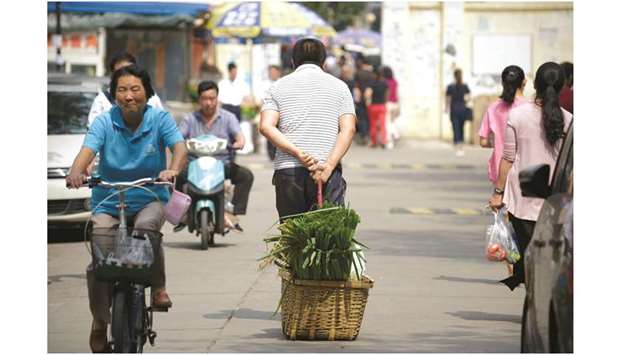The Chinese government’s annual economic policy meeting which concluded last week signals a continuation of the current moderate stimulus strategy with only fine-tuning likely, economists said.
Policy makers pledged to keep next year’s economic growth “within a reasonable range,” highlighting the need to achieve its goal of “building a moderately prosperous society” in 2020. Economists including Lu Ting at Nomura International Ltd in Hong Kong expect that the annual economic growth target will be trimmed to “about 6%” when it is released early next year.
“We expect China’s 2020 policy stance to resemble that of 2019, with a significant focus on fiscal policy to prevent a sharper economic slowdown,” said Marie Diron at Moody’s Investors Service in Singapore. “The effectiveness of fiscal stimulus in supporting growth will be hindered by the rising risk aversion of banks, companies and households, in light of heightened uncertainty around the pace and composition of China’s economic growth.”
The government said it will focus more on improving the effectiveness of fiscal policy. The pledge to consolidate the effect of tax cuts this year “almost rules out the possibility of further tax cuts,” said Goldman Sachs Group Inc economists in a note.
That viewpoint was echoed by Morgan Stanley economists led by Robin Xing, who said that “fiscal policy may shift from tax cuts to direct spending, with stronger pass-through and more focus on digital infrastructure and city cluster connectivity”.
On the money and credit front, the wording was changed to “flexible and appropriate” from “appropriately loose or tight” last year, suggesting that policymakers are ready to tweak the monetary stance if needed. “We expect some moderate easing,” said Nomura’s Lu. “But we do not expect another round of massive credit stimulus”.
The “three critical battles” against poverty, financial risks and pollution remain a priority for China in 2020. However, policy makers slightly adjusted the order of the three tasks. Combating poverty has now become the first, while preventing financial risks was downplayed in the statement.
Economists noted the lack of any mention of inflation. Instead, the statement emphasized only the need to stabilise pork supply and prices.
“This implies that the authorities have treated the higher CPI as a micro level issue, which means the elevated headline CPI could be less of a constraint for policy easing on a macro level,” said Goldman Sachs economists. China’s headline inflation figure rose to the highest level since 2012 of 4.5% in November, and may peak in January.
Policy makers reiterated that they’ll stick to the principle that “houses are for living in, not speculation”. They also made a pledge to stabilise home prices, land prices and expectations, as well as to give cities more discretion by fully implementing the “city-specific policy based on local conditions”.
Goldman Sachs economists said the term of keeping property prices stable can be interpreted as a goal “to prevent prices from changing too dramatically in either direction.” Nomura economists said “Beijing may again feel compelled to marginally ease restrictions on the property sector,” with increasing growth headwinds expected in coming months.

A man pulling a basket of leeks as he walks along a road near an open market in Beijing (file). The u201cthree critical battlesu201d against poverty, financial risks and pollution remain a priority for China in 2020.
